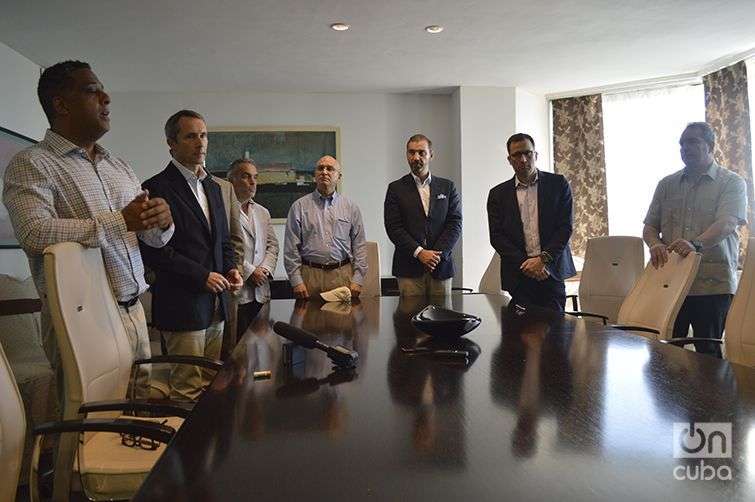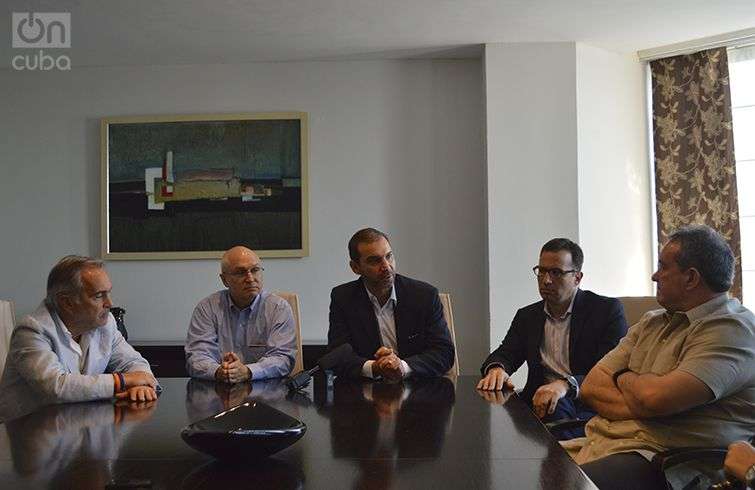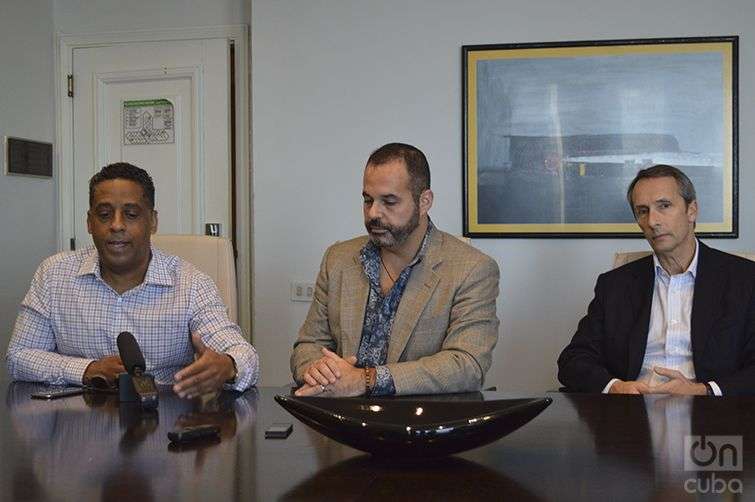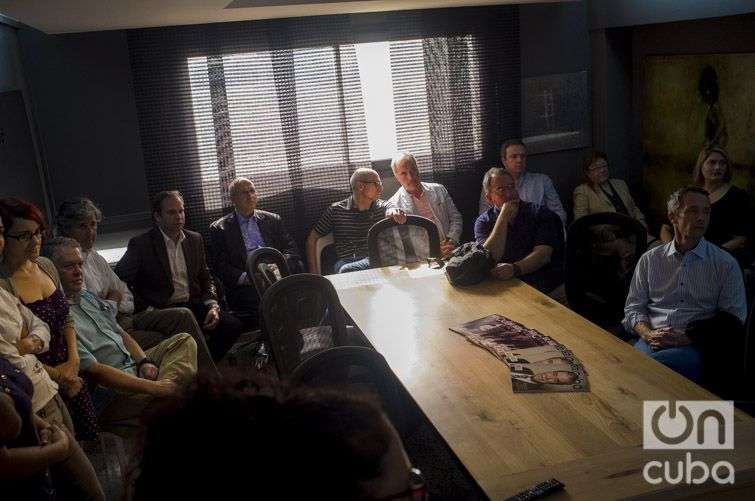What are the opportunities for Americans to invest in Cuba? In what sectors of the economy could they get involved? A group of senior executives from the U.S. travelled to Cuba to find the answers to those questions.
“Mission Knowledge,” as it is called, was organized by Knowledge@Wharton – the online business analysis journal of the Wharton School of the University of Pennsylvania – and Momentum, in collaboration with OnCuba.
“This trip is an opportunity to come out of the dark and engage in a more open exploration,” said Gustavo Arnavat, one of the representatives of The Wharton School’s Knowledge@Wharton.
At a press conference, some of the nearly 30 executives said that it will still take a while before any agreements can be signed, something that according to them will largely depend on regulations in both countries.
Boris Hirmas, CEO of Tres mares and SouthAm Freeze Dry, said that to succeed in any business initiative, whether in Cuba or anywhere else in the world, it’s necessary to have as much information as possible about the conditions for a given initiative to be developed.
“If there’s something we’ve learned this week is that we need more information,” he said, “and we need to be more patient. We need to understand the evolution of the situation in Cuba, and be aware that the country is not only open to the United States, but to the rest of the world as well.”
OnCuba asked the participants if they thought American business people were afraid to be displaced by companies from other countries that for years have been doing business with Cuba, and don’t have to deal with government policies that interfere with bilateral trade.
Guillermo Santa-Cruz, Vice President for Latin America, Mexico & US Hispanic at IMG Media and a former producer of Radio Marti, said that the other side was more likely to be concerned: “It’s the other countries who should be worried about Americans taking part in the game. We are closer and we are bigger.”
About the same question, Gustavo Arnavat said that many countries are trying to get established in Cuba before the end of the embargo.
“But Cuba is not like China,” he noted. “Cuba is smaller and the opportunities here are therefore not as many. However, I think that American companies are very competitive, and that even if there are companies from other countries that have been operating in Cuba for longer, in time American corporations will have a good chance to come to Cuba and take part in the competition.”
As for the obstacles in place, the visitors agreed that 10 months is not enough time to have a clear idea of the real business opportunities available, but also noted that it is necessary to make the rules of the game clear for investors.
Hirmas quoted a few examples: “It’s important to know a wide range of details, from the stability of power supply, to work place structure and organization. Is there a mixed type of mangement? Who is the boss? Is there a boss? How do unions operate? Are there unions? What are the regulations in terms of training? Are supplies steady, especially in the case of food? Is the cold chain guaranteed? All this is critical for the success of any kind of business. We need to understand what variables come into play in Cuba. At this point, we are simply outlining the business plan.”
Santa-Cruz was optimistic about this issue: “There are challenges that are particular of Cuba, but some others are common to other countries too. We have to adapt to the laws and regulations here, like we do in other countries. The difference is not that big.”
Marko Dimitrijevic, chief investment officer and founder of Everest Capital, said that it was very interesting to see the changes made by the Cuban side and the fact that there is interest in opening new sectors and starting projects.
“There’s a list of projects for foreigners. The United States owns 20{bb302c39ef77509544c7d3ea992cb94710211e0fa5985a4a3940706d9b0380de} of the world economy, but the other 80{bb302c39ef77509544c7d3ea992cb94710211e0fa5985a4a3940706d9b0380de} also have opportunities here, and Cuba is open to that,” he said.
Hugo Cancio, CEO of Fuego Enterprises, Inc (FUGI) and Editor in Chief of OnCuba, said that “it is extremely important to remember that there is an embargo. We have to work on that. We need to understand that after 50 years of bad relations, aggravated by laws like the U.S. embargo of Cuba, it is necessary that American business people come to Cuba and see for themselves what is going on in Cuba, with a view to building new relations.”
Cancio said that Cuba is a different country, but this is about “building relations and trust. It’s important that potential American investors and business people come to Cuba not only to explore, but also to push for the end the embargo, and be ready to get into this market. There’s no doubt that Cuba offers multiple opportunities, and that’s why we are here now, and we will continue to bring business people, to continue to foster those relations.”
The program of the trip
This trip to Cuba gives continuity to a series of events organized to promote business relations between the U.S. and the island nation, such as the Cuba Opportunity Summit, the U.S.-Cuba Corporate Counsel Summit and the Cuba Infrastructure, Finance and Investment Summit.
Hugo Cancio said that there was something missing in those previous meetings: that the Americans taking part had the opportunity to come to Cuba, and be directly in touch with Cuban officials, especially those who are making the decisions about how to move the country forward in the process of change. And there was also the need to get to know the Cuban people and their culture.
The program of the trip was designed by OnCuba Travel, a recently launched travel agency of the Fuego Enterprises group. It included visits to places of interest and meetings with high ranking officials.
One of the highlights of the program was a meeting with Josefina Vidal, Director General of the Cuba-US Relations Department at the Ministry of Foreign Affairs, and her deputy, Gustavo Machin.
The visitors also met with officials at the Special Economic Development Zone in Mariel, where different options for investment were discussed, as well as with officials at the Ministry of Communications, the country’s sole telecommunications provider ETECSA, and ALIMPORT.
At the University of Havana, they met with the Vice-rector of Information and Communication Francisco Gonzalez, and renowned Cuban economist Juan Triana.
The American Charge d’Affairs Jeffrey DeLaurentis also met with the delegation.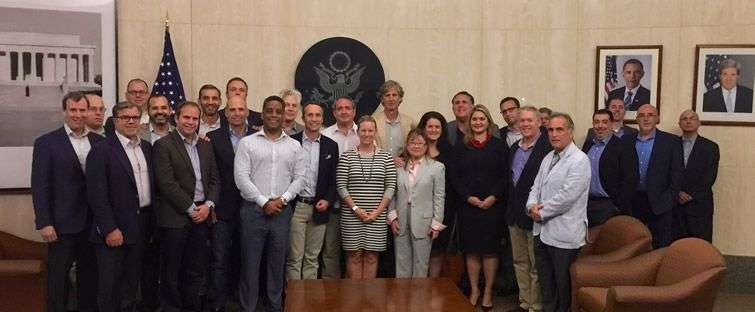
They also toured Old Havana and met with directors of the Office of the Havana Historian.
They paid a visit to the news bureau of OnCuba in Havana, where they learned about the work of the American media outlet on the island and the role of communication in the economic development of the country.
“Exploration is the first step in any kind of business venture,” said James Gomez, a private investor with over 30 years of experience. “For us, having a guide like Hugo Cancio, who is very familiar with potential opportunities here, has been essential. He has facilitated meetings with important decision makers, and we have learned many things about Cuba. It’s very important to be here from the start.”






